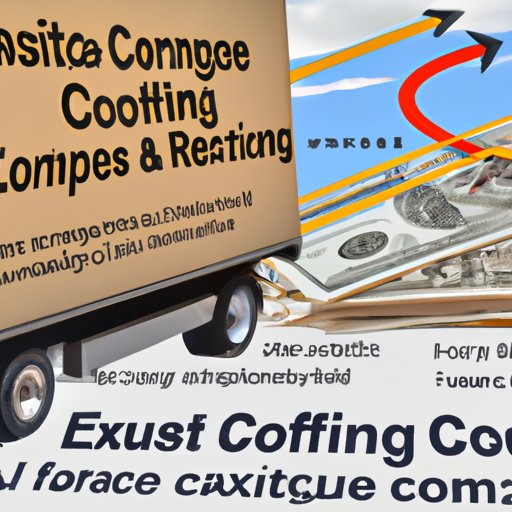Introduction
When it comes to relocating, moving cross country is one of the most challenging and expensive endeavors. While there are plenty of benefits that come with a big move, such as new career opportunities, expanded cultural experiences, and a chance to start fresh, understanding the cost of moving cross country is essential for making sure your relocation goes smoothly. In this article, we’ll explore all the different costs associated with moving cross country, from hiring movers to purchasing packing materials, and provide tips on how to keep your move affordable.
Cost Breakdown for Moving Cross Country
The first step in budgeting for a cross-country move is to understand the various costs involved. According to the American Moving and Storage Association (AMSA), the average cost of an interstate move is $4,300, but the total cost will vary depending on the size of your move and the services you need. Here’s a breakdown of some of the most common expenses associated with a long-distance move.
Cost of Packing Materials
Packing materials are one of the most overlooked costs when it comes to moving. Boxes, bubble wrap, packing paper, tape, and other materials can quickly add up, and you may even need to purchase specialty items like mattress bags or wardrobe boxes. Most people underestimate the amount of packing supplies they’ll need, so it’s best to overestimate and order more than you think you’ll need.
Cost of Hiring Movers
Hiring professional movers to pack and transport your belongings is one of the biggest costs associated with a cross-country move. The cost of hiring movers depends on the size of your move, the distance you’re traveling, and the services you require. Some movers charge by the hour while others charge a flat fee based on the weight of your belongings and the distance traveled. It’s important to get quotes from several different companies before making a decision.
Cost of Transportation
If you don’t hire professional movers, you’ll need to factor the cost of renting a truck or trailer into your budget. U-Haul, the most popular rental truck company, charges an average of $1,200 for a one-way trip across the country. You’ll also need to factor in the cost of gas and any tolls you’ll encounter along the way.
Cost of Storage
If you’re not able to move into your new home right away, you may need to store some of your belongings until you’re ready to move in. Self-storage units range in price from around $50 to over $200 per month, depending on the size of the unit and the length of time you need it for.

What to Expect When Moving Long Distance
Before you make the move, it’s important to understand what to expect when moving long distance. Here are some of the most important things to consider when planning a cross-country move.
Time Frame
Moving across the country can take a lot longer than you might expect. Depending on the distance, it can take anywhere from a few days to several weeks to complete the move. If you’re hiring professional movers, they should be able to provide you with an estimate of how long the process will take.
Unforeseen Costs
No matter how much you plan ahead, there are always going to be unexpected costs associated with a big move. It’s important to leave room in your budget for these unforeseen expenses, such as last-minute packing materials or extra fuel costs.
Insurance
Most professional moving companies offer insurance plans to cover the cost of any lost or damaged items during the move. This is typically an additional cost, but it’s worth it for the peace of mind it provides. Be sure to read the fine print of any insurance plan carefully before signing up.

Tips for Minimizing the Cost of Moving Cross Country
There are a few simple steps you can take to minimize the cost of your cross-country move. Here are a few tips for keeping your moving costs down.
Comparison Shopping
When it comes to hiring professional movers, it pays to shop around. Get quotes from at least three different companies and compare their services and prices. Don’t be afraid to negotiate – many companies are willing to work with you on the price.
DIY Packing
If you’re willing to put in the extra effort, packing your own items can save you a lot of money. Just make sure you have enough packing supplies and take the time to properly secure your belongings. If you don’t feel comfortable packing yourself, many moving companies offer partial packing services.
Utilizing Friends and Family
If you have friends or family members who are willing to help, taking advantage of their assistance can save you money. Ask them to lend a hand with packing, loading, and unloading, and be sure to thank them for their help.
Decluttering
One of the easiest ways to reduce the cost of moving cross country is to declutter your home before you move. Sort through your belongings and get rid of anything you no longer need or use. This will reduce the amount of stuff you need to move, which can save you money on packing materials, transportation, and storage costs.
A Guide to Budgeting for a Cross Country Move
Creating a budget for your cross-country move is essential for ensuring a successful relocation. Here are a few tips for budgeting for a move:
Estimate Total Cost of Move
The first step in budgeting for a move is to estimate the total cost. Start by researching the cost of packing materials, hiring movers, renting a truck, storage fees, and any other expenses you anticipate incurring. Add up all the estimated costs and set aside a realistic budget for the move.
Set Realistic Goals
Once you’ve calculated the estimated cost of the move, it’s important to set realistic goals for staying within your budget. Consider setting a percentage of your budget that you want to save, and look for ways to reduce costs wherever possible.
Shop Around for Best Prices
When it comes to hiring professional movers or renting a truck, it pays to shop around. Compare prices and services from several different companies to make sure you’re getting the best deal possible.
Make a List of Must-Haves
As you budget for your move, make a list of must-have items. These are the items you absolutely cannot live without, such as furniture, appliances, and electronics. Prioritize these items in your budget and make sure they’re accounted for in your total cost estimate.
An Overview of the Average Cost of Moving Across the Country
Now that you know the different costs associated with moving cross country, let’s take a look at the average cost of a long-distance move. According to the AMSA, the national average cost of an interstate move is $4,300. However, the cost of a move can vary significantly depending on the size of the move, the distance traveled, and the services required.
National Average Cost
According to the AMSA, the average cost of an interstate move is $4,300 for moves between 400 and 500 miles. For moves between 500 and 1,000 miles, the average cost is approximately $6,400. For moves over 1,000 miles, the average cost is closer to $8,500.
Regional Variations
In addition to the national averages, the cost of a move can vary significantly depending on the region. Moves to and from the West Coast tend to be more expensive, while moves to and from the Midwest and South tend to be less expensive. It’s also important to note that large cities often have higher moving costs due to traffic and parking restrictions.

Understanding the Factors That Affect Moving Costs When Moving Cross Country
In addition to regional variations, there are several other factors that can affect the cost of a cross-country move. Here are a few of the most important factors to consider when budgeting for a move.
Distance
The distance you’re traveling is one of the most important factors when it comes to estimating the cost of a move. Generally speaking, the farther you’re traveling, the more expensive the move will be.
Weight
The weight of your belongings is another important consideration. Most moving companies charge by the pound, so the more stuff you have to move, the more it will cost.
Seasonality
The time of year you’re moving can also affect the cost. Summer is usually the busiest season for movers, so prices tend to be higher during this time. If possible, try to plan your move for the off-season to save money.
Special Services
Some moves require special services, such as crating, piano moving, or hoisting. These services can add to the cost of the move, so it’s important to factor them into your budget.
Conclusion
Moving cross country can be an expensive endeavor, but understanding the costs involved and budgeting accordingly can help ensure a successful move. To recap, the average cost of a cross-country move is $4,300, but prices can vary significantly depending on the size of the move and the distance traveled. There are a few simple steps you can take to keep your costs down, such as comparison shopping, packing yourself, and utilizing friends and family. With careful planning and budgeting, you can ensure that your move goes smoothly and stays within your budget.
(Note: Is this article not meeting your expectations? Do you have knowledge or insights to share? Unlock new opportunities and expand your reach by joining our authors team. Click Registration to join us and share your expertise with our readers.)
